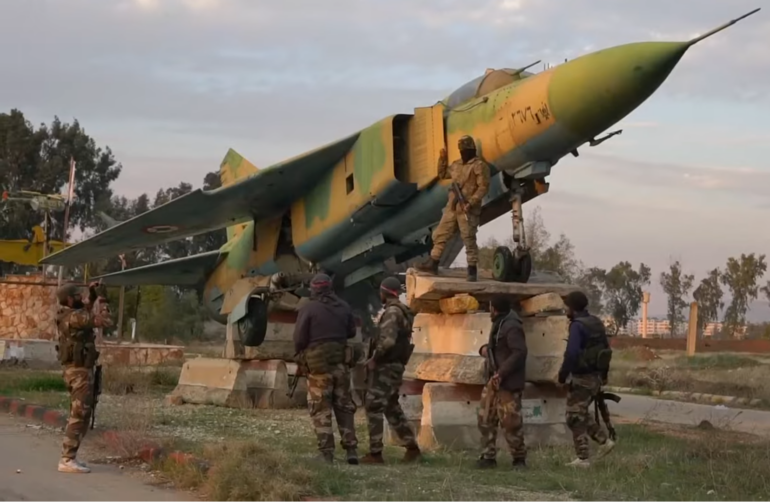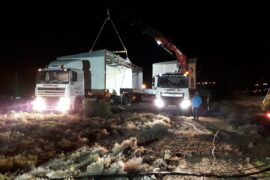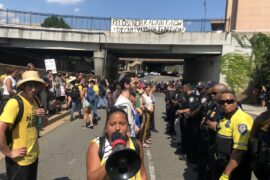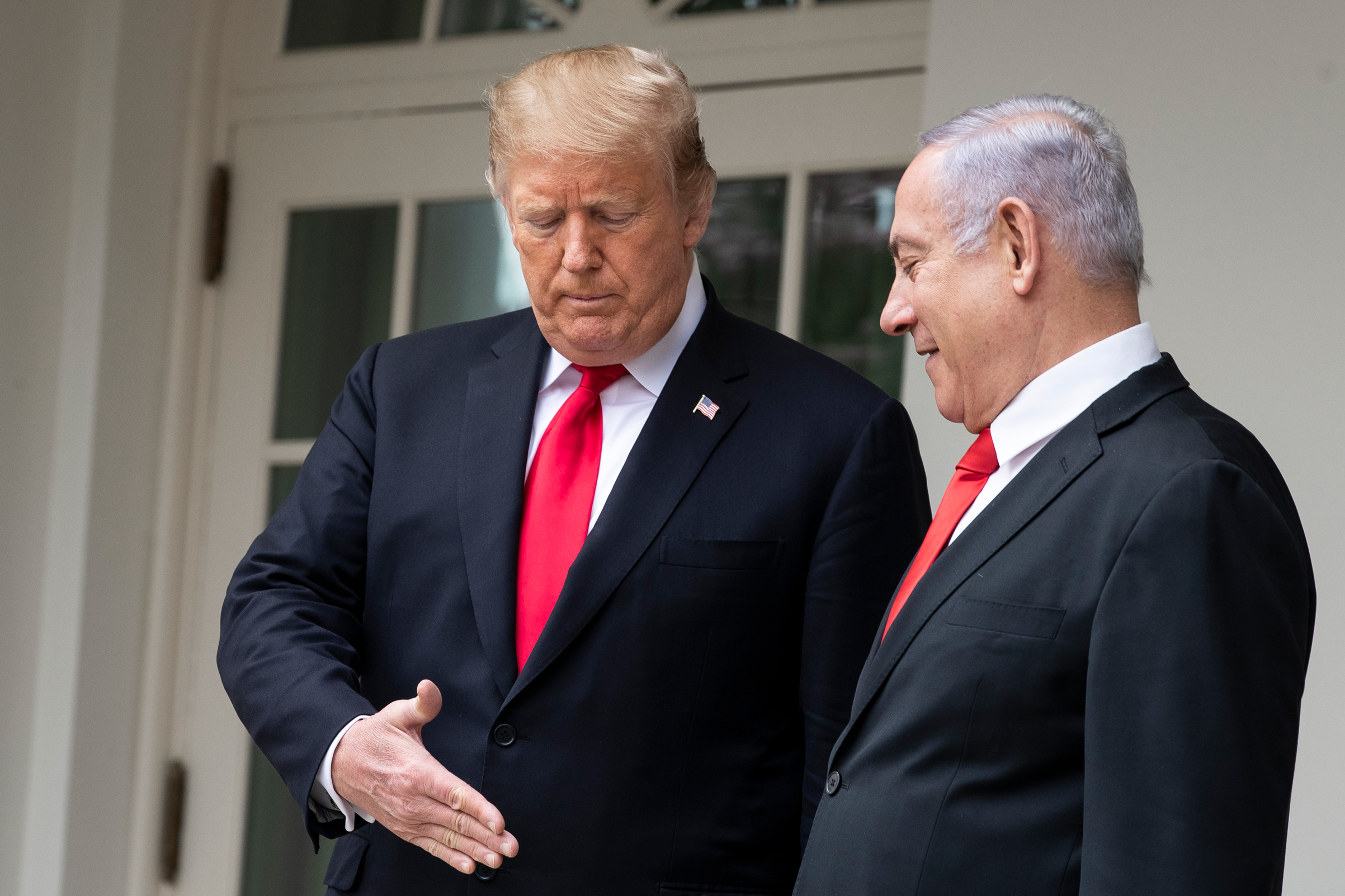The Ba’athist Assad regime has at long last fallen to revolution in Syria.
The Syrian military command informed its officers early Sunday morning that the rule of President Bashar al-Assad has ended.
At roughly the same time, Syrian rebel groups – most notably Hay’at Taḥrir al-Sham (HTS) and the Free Syrian Army (FSA) – announced that Damascus had been liberated.
Demonstrating understandable caution, Israel swiftly conquered the Syrian side of the Hermon mountain range, as well as several other significant points, to expand a demilitarized buffer zone along the Israel-Syria border.
Holding these high ground positions enables Israel to anticipate in advance any potential invading force.
Not knowing what to expect from the new government taking form in Syria, Israel also proceeded to also destroyed all of the Assad regime’s chemical weapons facilities, all missiles, all air force (aircrafts and helicopters), all navy (ships and submarines), and all anti-aircraft systems.
In a video statement on Tuesday, Prime Minister Binyamin Netanyahu (Likud) said that Jerusalem wants to establish good relations with the new government in Damascus, but won’t hesitate to attack if necessary.
“We have no intention of interfering in the internal affairs of Syria,” he said.
“But we certainly do intend to do what is necessary to ensure our security.”
He went on to explain that the Israeli Air Force is striking “military strategic capabilities” left by Assad’s military in order to prevent them from falling into the hands of those who could potentially threaten the Jewish state.
“We want correct relations with the new regime in Syria,” he continued.
“But if this regime allows Iran to reestablish itself in Syria, or allows the transfer of Iranian weapons or any other weapons to Hezbollah, or attacks us, we will respond forcefully and we will exact a heavy price from it.”
“What happened to the previous regime will also happen to this regime,” he warned.
Defense Minister Israel Katz (Likud) echoed the prime minister’s warning, stating that any entity posing a threat to Israel will be targeted.
“The IDF has acted in the last few days to attack and destroy strategic capabilities that threaten the State of Israel,” he said.
“Whoever follows Assad’s footsteps will end up like Assad.”
While Israel’s caution regarding the rebels and their intentions is understandable, Jerusalem should also assess the strategic opportunities created by the developments in Syria, as well as the broader implications for bringing the Semitic region more in line with the interests and aspirations of the Jewish people.
Firstly, we should see the fall of the Assad regime as a positive occurrence for those who had been living under it until now. The end of Bashar al-Assad’s oppressive rule holds great promise for the peoples of Syria (with the notable exception of the Iranian-backed Alawite minority Assad represented).
Second, we should also recognize that while most Israeli and Western analysts have been viewing Hay’at Tahrir al-Sham as a one dimensional “jihadist” militia with roots in al-Qaeda, it’s important that we develop a multidimensional perspective that understands the nuanced complexities, dangers, and opportunities presented by the possibility of an HTS government in Damascus.
HTS leader Ahmad Hussein al-Sharaa (Abu Mohammed al-Julani) has publicly distanced himself from his al-Qaeda past and is currently seeking to present a more moderate image to the world. The Syrian rebels have expressed a desire to establish a new regime with equal rights for minorities and free elections, structured according to a “radical” yet non-coercive interpretation of Islam that fits the identity and culture of the Syrian people.
There may be good reasons to suspect HTS of attempting to deceive Israel and the West in order to avoid interference in their plans to build a post-Assad Syria but there’s equal danger in Jerusalem missing an historic opportunity by not considering the possibility that al-Sharaa’s statements are genuine.
It should also be noted that the Sunni Islam represented by HTS carries far more potential than Shiite Islam to allow the theological space for a meaningful partnership with the children of Israel. A multilayered analysis of the dynamics at play in the region mustn’t exclude the possibility of an Israeli alliance with not only the “moderate” but also some “radical” Sunni elements.
The Syrian rebels have sent mixed messages regarding their intentions towards Israel. Videos have surfaced showing rebels enthusiastically calling to proceed from Damascus to Jerusalem but statements have also been released expressing appreciation for the fact that the revolution was only successful due to Israel’s weakening of Hezbollah in recent months and stating a desire for good relations with Israel.
“Syria will not wage a new war with Israel. The country is not ready for another war. Our biggest threat is Hezbollah and the Iranian-backed Shiite militias in Syria.”
The fact that HTS is publicly expressing a desire to avoid conflict with Israel presents Jerusalem with an opportunity to enter into this relationship from a position of strength.
Prime Minister Netanyahu has shown Israel to be the regional power in West Asia, leading other players in the region to desire peace. But in order to make this desire outlast the current displays of Israeli strength, Jerusalem must also demonstrate that the Jewish nation is just and righteous according to the standards and ideological paradigm of Sunni actors in the region. Not only should Israel’s neighbors be afraid to fight us. They should see no reason to even want to fight us.
The best path forward for Israel under the current circumstances might be to show strength through ruthlessly attacking Iran and its remaining Shiite allies in the region, while extending a firm hand of friendship to the Sunnis, both “moderate” and “radical” alike (with the obvious exception of Hamas).
Jerusalem has an important opportunity to position itself as a powerful “judge” in Sunni-Shiite tensions and can maximize this opportunity by decisively acting on behalf of the Sunnis. But Jerusalem must do so not in the name of Western interests or economic considerations but rather from within a new pan-Semitic ideological paradigm that creates a shared spiritual-political language between Jews and Sunni Muslims.
Israel’s current coalition, comprising the Ḥaredi and national-religious Knesset factions, is actually very well equipped for this.
By simultaneously demonstrating a genuine desire for partnership in transforming the region for the benefit of its inhabitants, together with a firm resolve to boldly assert and defend Jewish national interests and values, Israel could communicate to the Syrian rebels – as well as other relevant players in the region – that we seek to create a Semitic alliance that not only fosters real unity between our peoples but also mutual cooperation in weakening Tehran and freeing our region from the dominance of Western powers who have until now benefitted themselves through keeping us divided.





